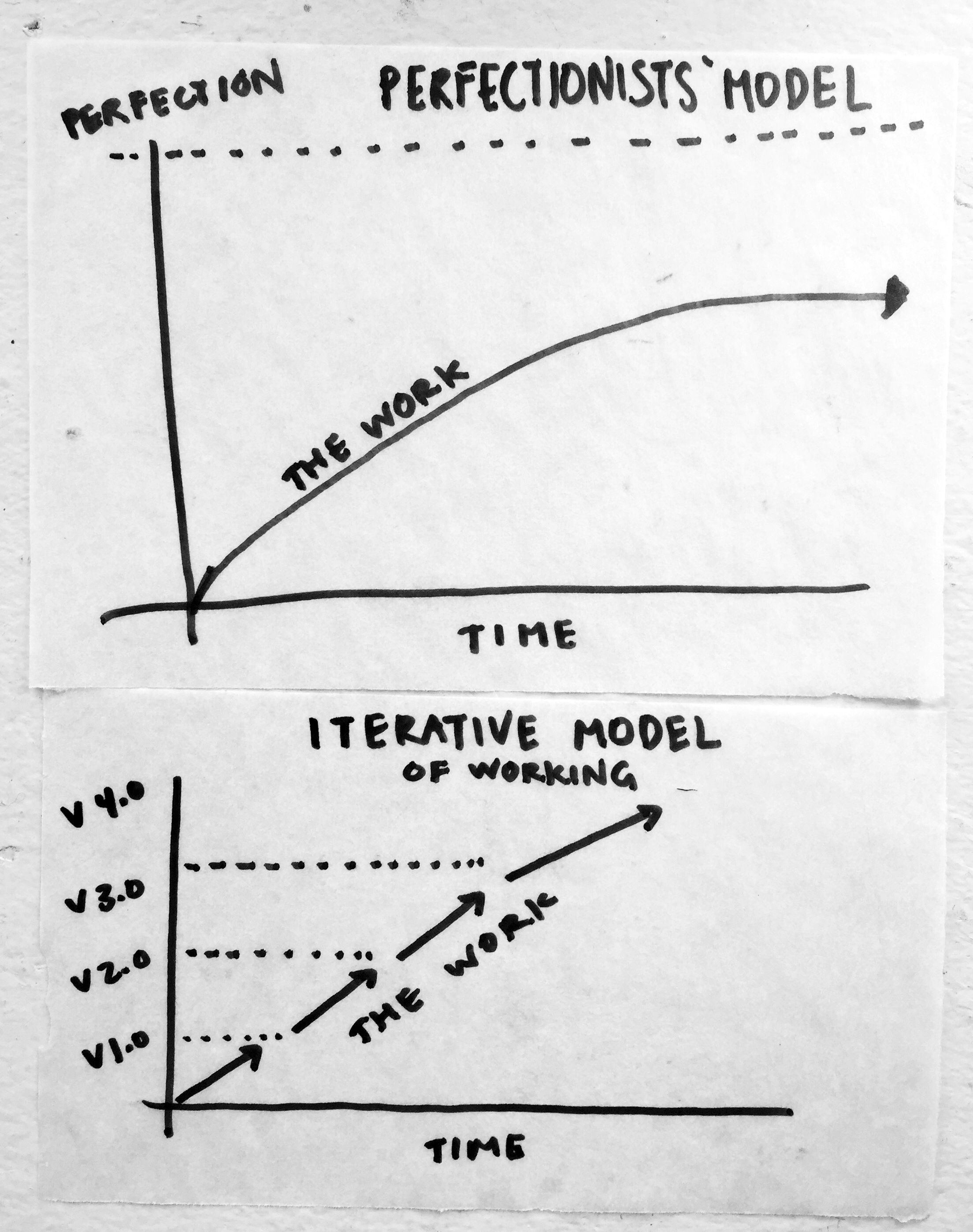Aim for iteration, not perfection
When it comes to undertaking any daunting task — building a business from scratch, creating a piece of creative work, or aiming for some other ambitious goal - it’s too easy to get bogged down in the details. As a long-suffering perfectionist with a submerged urge to prove myself to the world, I tend to say to myself: OK, let’s take this from the top, and make sure everything I make is perfect and beautiful before I continue.
The problem with that? I get tunnel vision and stuck on little details that may or may not help with my end goal. After a bit of endless looping, I get discouraged and convince myself it wasn’t meant to be. I start thinking wild thoughts and wondering if I should’ve applied to business school… (Well, not really).
Iterative thinking
In the startup world, the solution to paralysis is to use iterative thinking - as in, instead of aiming for your ideal version of something, focus on building a minimal viable product. In tech, you’d ask yourself: what’s the most basic version of this app/website/product that we can rapidly prototype? and you improve it in quick, iterative cycles.
What happens if we applied this method of thinking to doing creative work and productivity? As in: when you're thinking about reaching a milestone or goal, focus on the bare bones, the core essence of that goal.
Why it works
You get immediate feedback. I don't even mean from other people; I mean from yourself. You can't assess how well you did on something until you have that thing right in front of you.
Immediate feedback means you can make it better. A bad draft is better than no draft. Just remind yourself that it’s supposed to be bad. Now you have somewhere to go. It is far more effective to make something better than to be perpetually stuck in phase 1, and then get so sick of it that you won't want to look at it again. You've traumatized yourself by that point.
You’ll feel good and find momentum to continue making it better. The key here is to set your expectations low. Have a series of low expectations for each “round” of work that you do, and they will add up. You’re not trying to climb the entire ladder at once; just one rung at a time. You feel a sense of accomplishment for just having that thing up- whether it's a website or logo or app or first draft.
Example 1: Starting a new freelance design studio
When I was considering quitting my job, there were a deluge of details that could overwhelm me (I need to buy health insurance, give notice to my boss, I needed to get a website and business cards, I needed social media accounts).
Then there were the bare bones. What is the core essence of quitting my job and starting a studio? For me, it boiled down to three things.
- Have service offerings.
- Be immediately hirable.
- Have a marketing plan.
I could have spent weeks on designing the perfect business cards, months on putting together the perfect website, but instead, I focused on the most direct path from A to B. In two weeks, decided on a brand and the services I would offer. In one week, I put together a basic website with a contact me form. Then, in a week, I outlined a very basic marketing plan. Each thing was far from 100% done (then again, would it ever be???) but at least I had gone through each step. I had officially “opened” version 1.0 of my design studio.
This simplified to-do list of the bare bones is much easier to keep track of than a list of a million little things, and it help me get momentum to get feedback, and quickly improve.
Example 2: Doing a design/illustration project (or any project, really)
When I’m working on a creative project, sometimes I get stuck in the research and ideation phase. I spend hours browsing Pinterest, researching interesting articles or essays, falling into internet rabbit holes.
That’s when I might push myself to just pick 1 idea and do 30 minutes of sketching, writing, or designing a rough mockup. Research and ideation is necessary, but after a certain point, it’s a form of procrastination; taking you further away from your end goal of the work itself.
How to start an iterative way of working
- Define what your task is, what your end outcome looks like. Be as specific as you can.
- Identify your bottlenecks. What are the things that are likely to get you entangled, and keep you from moving forward? Some examples here: deciding on a name for a software, a lack of business cards, waiting for approval from someone else, just getting the first words on the page.
- Define what version 1.0 of your task looks like. This should be confined within the shortest amount of time you can possibly spend on it. Anytime you think of a new task, decide whether it belongs in your version 1.0 bucket, or a later version.
- Give yourself a time limit. What would happen if you HAD to write a rough draft / do a rough sketch / build a rough website within 3 days? What would you eliminate? What would you focus on? Challenge yourself to do that, and then build upon it.
All in all, it’s important to sense when you’re creating extra work for yourself. Ask yourself why. It is because you’re afraid of something? Is it because you feel the need to do more, show more, prove more to someone? To yourself?
Instead, stop being a perfectionist and ask yourself: what is the minimum I can do to make this thing real? What’s the most direct thing I can do to get myself from point A to point B?

